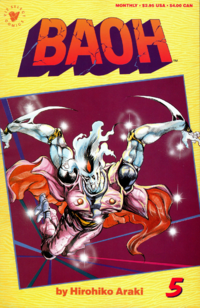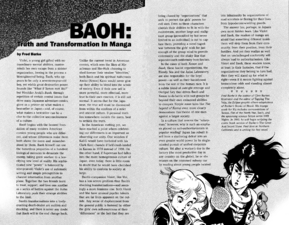BAOH (April 1990)

An essay from Fred Burke[a] discussing Baoh the Visitor that was included in the back of the fifth issue of VIZ Media's release of Baoh from April 1990.[1]
Interview
BAOH: Truth and Transformation In Manga
Violet, a young girl gifted with extraordinary mental abilities, masterminds her own escape from a sinister organization, freeing in the process a bioengineered being, Baoh, who appears to be only a seventeen-year-old boy, yet wields great destructive power. Sounds like "What if Xenon met Mai?" but Hirohiko Araki's Baoh, through repetition of certain central issues that drive many Japanese adventure comics, gives us a primer on what makes a best-seller in Japan―and, of course, what makes a best-seller can be a clue to the collective unconsciousness of a culture.
Baoh begins with the favored foundation of many modern American comics: young people who are different, and whose differences make them both above the norm and misunderstood by them. Baoh himself can use the hazardous properties of a hundred biological menaces to devastate the enemy, taking germ warfare to a horrifying new level of reality. His sophisticated new "power" is balanced by nine-year-old Violet's use of automatic writing and simple precognition to channel information from another plane. Together the two friends learn to trust, support, and love one another as a series of battles against the Judas Laboratory push their strange abilities to the limit.
Baoh's transformations into a body-crushing death-dealer are sudden and shocking, and there is never any doubt that Baoh will in the end change back. Unlike the current trend in American comics, which sees the likes of Miracleman and She-Hulk choosing to shed forever their weaker "identities," both Baoh and his spiritual half-cousin Asuka (Xenon) Kano would never give up their ability to blend into the whole of society. Even if their new self is more powerful, more effectual, more true to their own essence, it is still not normal. It seems that for the Japanese, the true self must be discovered from within the confines of a strict and ancient culture. If personal truth lies somewhere outside the norm, best to rethink the truth.
In the American melting pot, we have reached a point where celebrating our differences is as important as observing our unity. One wonders if Kal-El would have bothered with his Clark Kent charade if he'd crash-landed in Kansas in 1978 instead of 1938. On the other hand, if Superman had fallen into the more homogeneous culture of Japan, even today, there is little room to doubt that he would have cherished his ability to conform to society at large.
Baoh's companion Violet, like Mai, has a less severe problem than Baoh's shocking transformations―and seemingly a more feminine one. Both Violet and Mai have unusual psychic talents that are far from apparent on the outside. Any sense of displacement from the general public is fostered by either the girls' own self-awareness of their "differences" or the fact that they are being chased by "organizations" that seek to pervert the girls' powers for evil uses. Even as these characters cherish their abilities to fit in with the mainstream, another large and malignant group (personified by but never limited to an individual) is out to capture them, providing a novel tug-of-war between the girls' wish for just enough of the group mind to provide community and the shaky line that separates such conformity from fascism.
In the cases of both Xenon and Baoh, these fascist organizations, the Bloody Sea and the Judas Laboratory, are also responsible for the boys' power―as well as their banishment from the rest of the human race. It is a subtle blend of outright revenge and Oedipal fury that drives Baoh and Xenon to do battle with vast groups far beyond their own enhanced abilities to conquer. Simple ronin tales like The Legend of Kamui even more clearly demonstrate this theme of one man against a larger society.
In a culture that reveres the "salaryman," however, why is such an emphasis placed on anti-authoritarianism in popular reading? Japan has rebuilt itself from a shattering defeat into an even greater world power by its single-minded pursuit of unified corporate culture. Yet after a worker's day in the factory (the most productive day in any country on the globe), he or she relaxes on the crammed subway car by reading about young people twisted into inhumanity by organizations of mad scientists or fleeing for their lives from hypodermic-wielding guards.
The answer lies, perhaps, in Japan's own most hidden fears. Like Violet and Baoh, the readers of manga are afraid that something different inside them will strip them from their community, from their position, from their families. And yet they realize as well that an unchallenged conformity will always lead to authoritarianism. Like Violet and Baoh, these readers know, at least in their fantasies, that if the organizations they belong to turn bad, then they will stand up for what is right―even if it means fighting against tremendous odds and standing almost completely alone.
Gallery
Notes
- ↑ The English translator for VIZ's release of Baoh.

